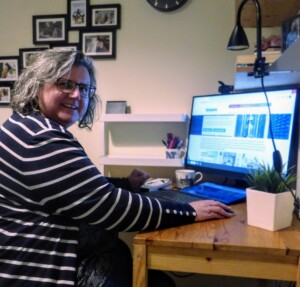Research Fellowship
Introducing the inaugural winner of the ORUK/Daphne Jackson Fellowship
We are delighted to announce that Dr Nikki Kuiper is the inaugural winner of the ORUK/Daphne Jackson Fellowship, which we have funded in partnership with The Daphne Jackson Trust. Dr Nikki Kuiper, who receives a three-year Fellowship, is a highly qualified academic with a biomedical PhD and a long-standing career in the musculoskeletal (MSK) field via a long association with the Robert Jones & Agnes Hunt Orthopaedic NHS Hospital (RJAH) in Oswestry. Her research will focus on analysing health data on MSK patients, particularly those with knee problems, to find out the period of time from knee surgery to total joint replacement. Dr Kuiper aims to help clinicians predict when and to whom cartilage repair may be successfully applied by developing an algorithm and ultimately a digital app to be used in outpatient clinics.
The Daphne Jackson Trust, through their Fellowships, are dedicated to supporting individuals returning to research after a career break due to illness, caring or family responsibilities. As well as financial support, the Fellowship offers retraining and mentoring which helps the recipient to develop the skills and the confidence necessary to pursue a successful and valuable career in research. Dr Kuiper had been a senior lecturer in the medical school at Keele University until she fell seriously ill with Invasive Group A Streptococcal (iGAS) disease in 2018. Further complications, including severe sepsis, led to a 3-week ITU-stay in an induced coma and an extended stay in hospital to recover her mobility. A slow recovery coincided with the Covid pandemic and, in 2021, now in good health, Nikki decided to seek a new career path.

The Fellowship offered her the chance to use her extensive knowledge of the MSK field and combine it with the opportunity to harness new technology to analyse “big data” (large, complex data sets) on patients with knee cartilage problems. Two major databases – the National Joint Registry established in 2002 which includes every patient who has had a joint replacement, and the UK Biobank which tracks risk factors for the major diseases of middle and old age – will provide the large volume of data needed. The project will be based in Dr Karina Wright’s regenerative medicine lab at the RJAH and hosted by the University of Keele’s School of Pharmacy and Bioengineering, and is co-funded by MRC. Dr Kuiper has previously worked with both organisations and also has access to a large cohort database as well as clinical trials data started by the late Professor James Richardson of the RJAH which provides >25 years of invaluable follow-up information on patients who have undergone knee cartilage repair procedures. As she explains, ‘The aim of the project is to work out the true effects of having knee cartilage surgery by studying health records and linking them to national joint registries. It will be possible to look at a whole range of issues including patient demographics and genetic risk factors so that clinicians can decide on the best course of treatment and potentially avoid unnecessary procedures.’
CEO of ORUK Arash Angadji said, ‘With one in five adults over 45 experiencing knee problems, this research project will be invaluable in improving patient outcomes and reducing pressure on the NHS. We are delighted to be working together with the Daphne Jackson Trust to fund this innovative work and to support Nikki with the next stage of her career.
‘It is also essential that we do everything possible to enable talented people who have experienced an extended career break, to return to research or retrain. Dr Kuiper’s story will hopefully serve as an inspiration for others who are considering a return to research.’
Dr Helen Marsh, Trust Manager at the Daphne Jackson Trust comments; ‘Nikki is an outstanding candidate and we are delighted to support her in her journey back to research.’